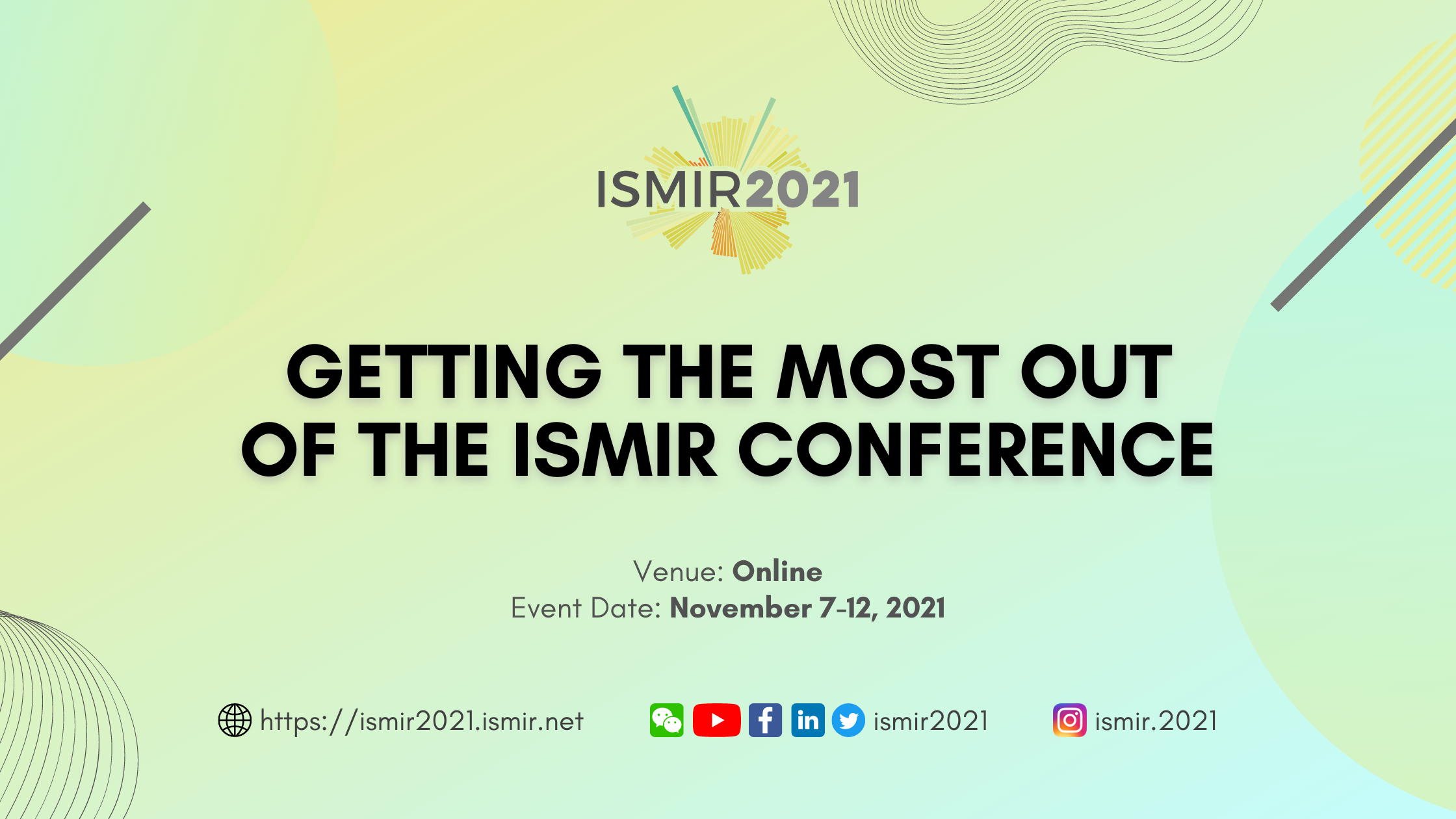
For this year’s virtual ISMIR conference, we expect many first-time attendees, and coming to a new conference can be intimidating. For this reason the Newcomer Initiatives Chairs (Nick Gang and Elona Shatri) and Diversity & Inclusion Chairs (Blair Kaneshiro and Jordan Smith) have been working on ways to successfully welcome everyone to our scientific community.
Community Survey
The first of these initiatives was a survey of experienced ISMIR attendees asking for their thoughts and advice on getting the most out of the conference. Questions included basic demographics, favorite parts of the conference, and reflections on how their first experiences could have been enhanced. We received great feedback from the community, and want to take this opportunity to thank everyone who participated!
The figures below show how many ISMIR conferences our respondents attended, and when they attended their first conference. Almost a quarter of these people attended their first conference in 2020, meaning their first experiences are still fresh in their minds!
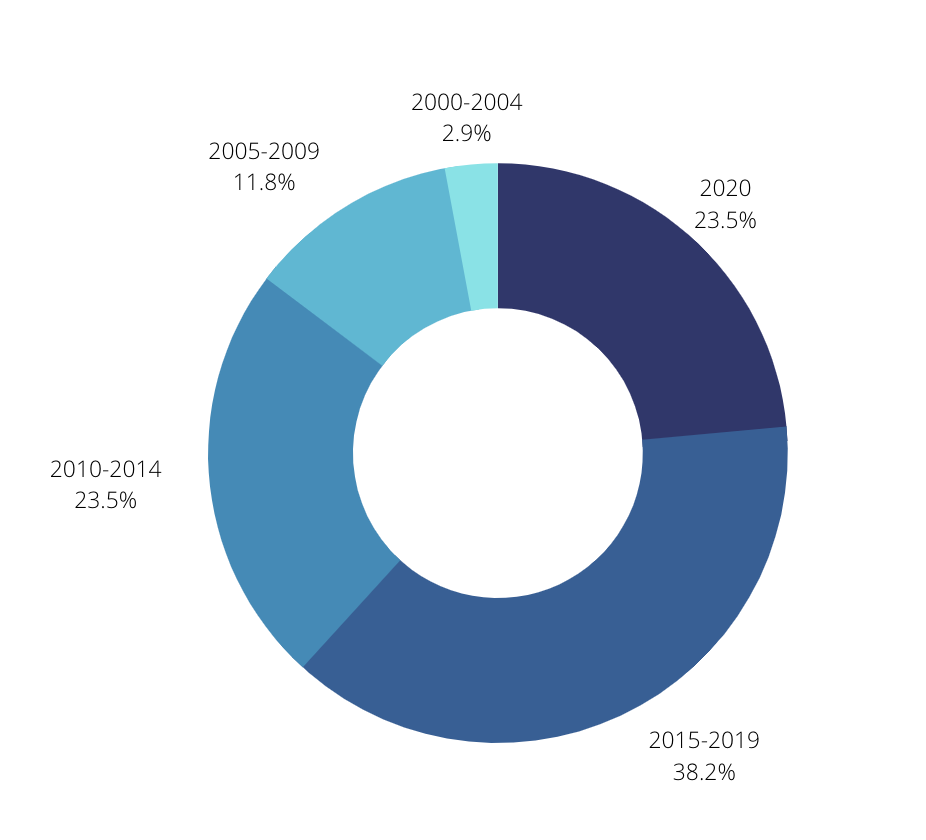
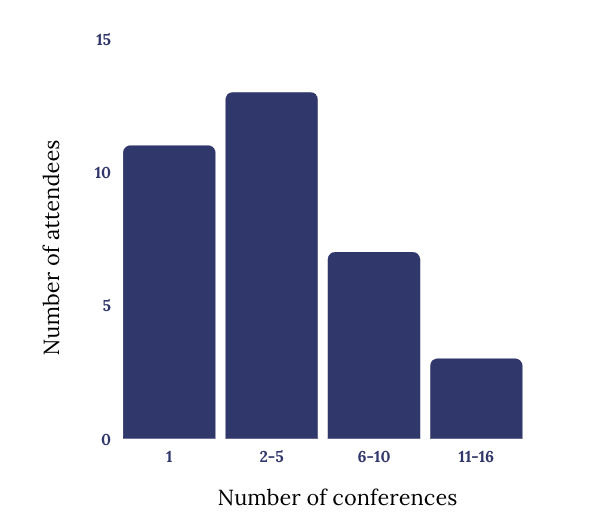
A majority of respondents had attended fewer than 5 conferences, but we also heard from a few seasoned ISMIR veterans who attended up to 16 conferences!
To help characterize what ISMIR is like for those who have never attended, we asked for a description of the conference in only three words. Here is how our respondents answered: 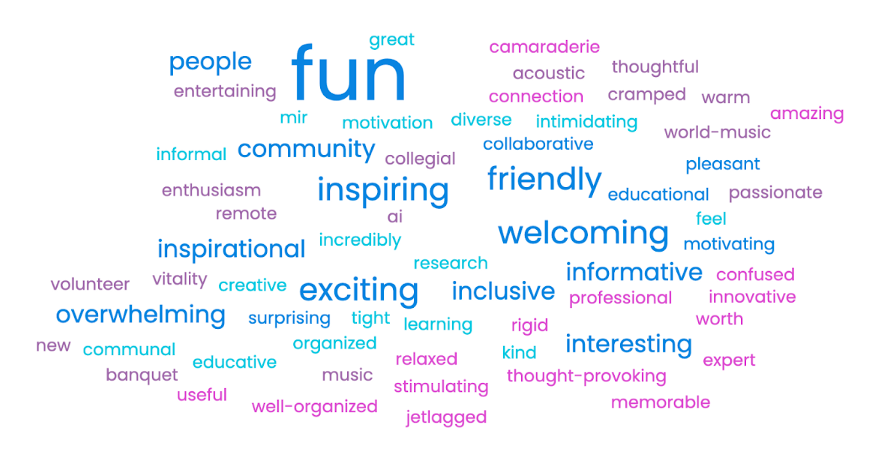
Attendees reported that they find ISMIR to be educational and informative, while also seeing it as an opportunity to share their favorite music and research interests with others. The yearly traditions, including playing music together at the jam session, contributed to the most common word used to describe the conference: fun! These descriptions show the presence of a strong sense of community at ISMIR that keeps many coming back each year. Some also acknowledged that the experience can be overwhelming and intimidating, which we hope to help with.
Among the responses were also some useful insights for navigating the virtual conference format. Distractions are unavoidable and hard to anticipate when attending a conference remotely. One person reported that dealing with several logins to different applications can make the experience seem more fragmented than attending plenary sessions in person. However, some found pre-planning which sessions to join, putting them in a calendar, and avoiding non ISMIR-related meetings to be helpful. Others found success by creating a routine for the week, prioritising live events over replays, and sticking to scheduled break times. 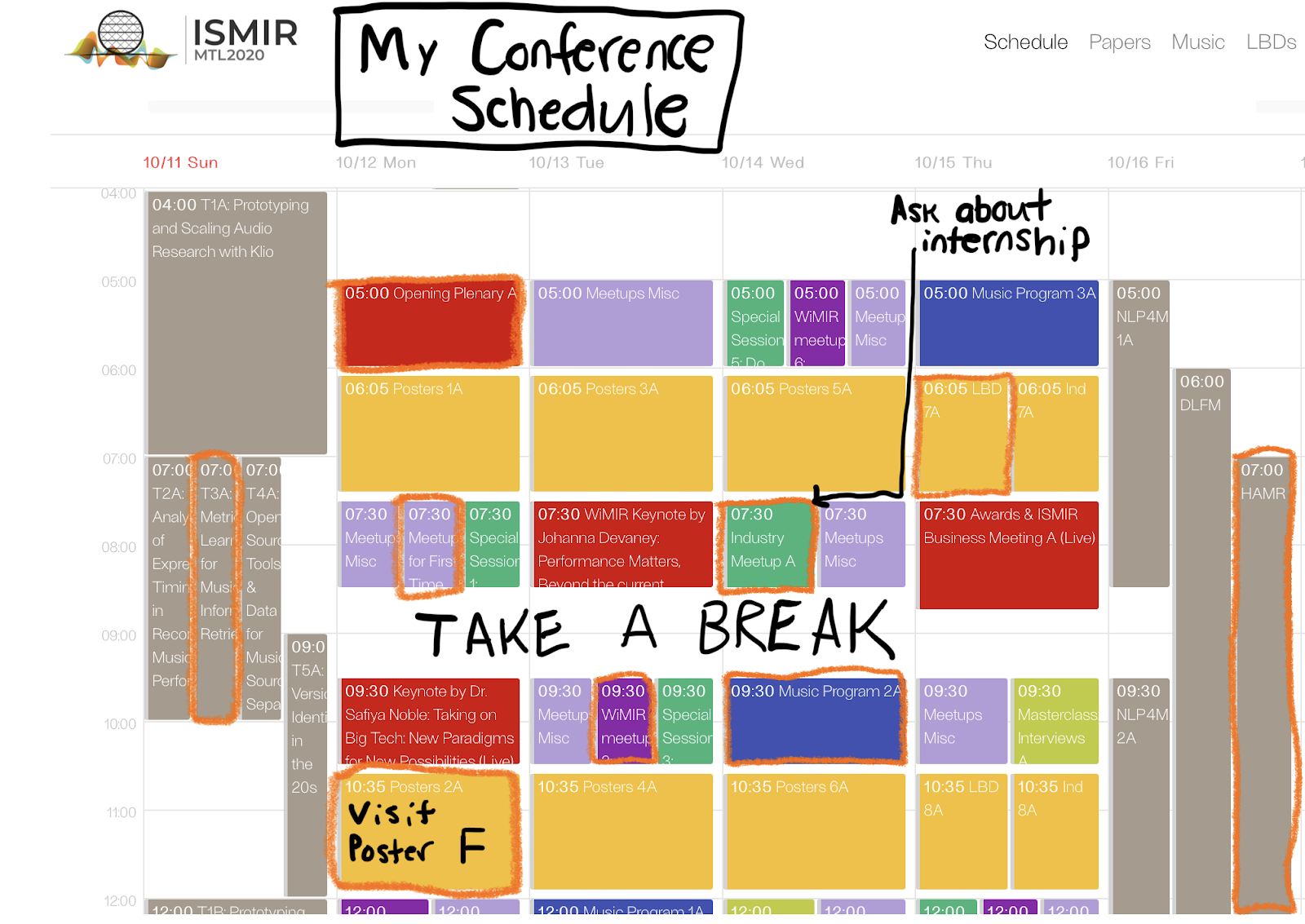
When asked what they wished they knew at their first ISMIR, two topics made up a vast majority of the responses. The first of these wishes was to have better networking skills before their first conference. Secondly, many remembered feeling surprised by the scientific program and wished they had better understood the more technical MIR research areas. These two subjects were clearly important to the “newcomers of the past”, and thus we will spend some time diving deeper into each of them.
Networking Advice
While networking can be difficult in normal times, interacting on a video conference adds an extra level of uncertainty. There is no singular networking strategy that will work for everyone, but conscientious preparation in advance can be quite helpful. From our post-survey conversations with ISMIR veterans, we came up with a short list of suggestions that may help.
If seeking to network with a specific person, do some advanced research into their background and their areas of expertise.
Do you know that a researcher who you admire or want to work with is attending? Try reading a full paper of theirs and come up with a question ahead of time. Don’t be afraid to clearly articulate why you want to network with them. If you made use of their research or reproduced their experiments, let them know. That could potentially lead to collaborations as well.
To get a conversation going, have a specific question ready about someone’s work, background, or perspectives on a topic.
A great part about coming to ISMIR is knowing you share some interests with almost everyone you meet. Take advantage of this when you’re feeling at a loss for words.
Find the mutual shared contacts between both of your networks.
MIR is a relatively small community and having a few colleagues (eg. labmates, supervisors) working in MIR is already a step towards creating a larger network. Often, you and the person you want to talk to know people in common. You can use these shared connections as a conversation starter.
A successful network is one that is established before you need it.
One way you can do this is to give before you get. Ask new contacts how you can help them, and don’t forget to follow up after the conference!
Networking at ISMIR2021
This year’s ISMIR conference will offer several programs to help put the above suggestions into practice. We have outlined some of these below.
Newcomer Squads
A quick and easy way to expand your network is to join a Newcomer Squad! This is a new initiative for the 2021 ISMIR conference that will pair an experienced ISMIR community member with a team of newcomers. Using the text-based chat on the virtual conference platform, Midspace, squad members will be able to ask questions and have discussions in a small, low-pressure environment. Newcomers can sign up here to participate, and ISMIR veterans can sign up to lead a squad here.
“Getting the Most out of ISMIR” Session
For more information on having a successful first ISMIR conference, we will be offering a special session on the first day of the main program. Many of the topics raised in the survey above will be discussed in more detail. This will include ways to organise your calendar, share tips with each other, and where to go if you encounter an unfamiliar concept. The sessions will also offer a live Q&A and discussion.
Lab showcase
Also new for this year’s ISMIR conference is the Lab Showcase. This activity features virtual booths hosted by MIR research labs from around the world. Attendees will learn about ongoing research and labs will provide live chat slots to answer questions. This is a great opportunity to scout out potential degree programs, expand your network, and to get a feel for what current MIR researchers are working on.
Industry Presentation and Panels
Anyone who is curious about companies working in the MIR space will not want to miss the industry sessions. The “presentations” session will include representatives from conference sponsors speaking about their companies and the types of work they do. Companies will usually advertise their open internship and full-time positions at this event as well.
The “panels” will feature discussions on specific topics with a mix of people from academia and industry. Topics will include applying MIR technology to education and designing systems that work for users across cultures. Don’t be afraid to follow up with a presenter if you think you would be a good fit at one of these companies!
Masterclasses
Masterclasses are intended to help students and recent graduates prepare for the transition to a role in industry. Sessions will include tips for technical interviews, writing production-quality code, and thinking about engineering systems design. Presenters include current software engineers at major music technology companies who know first-hand what to expect when applying for a job in industry.
Social Events
Informal social settings can be great opportunities for networking and serve as a fun break from the scientific program. This year’s conference includes yoga, trivia, and live jam sessions that are open to all participants. Exploring these activities is easy on the Midspace platform while browsing content by program.
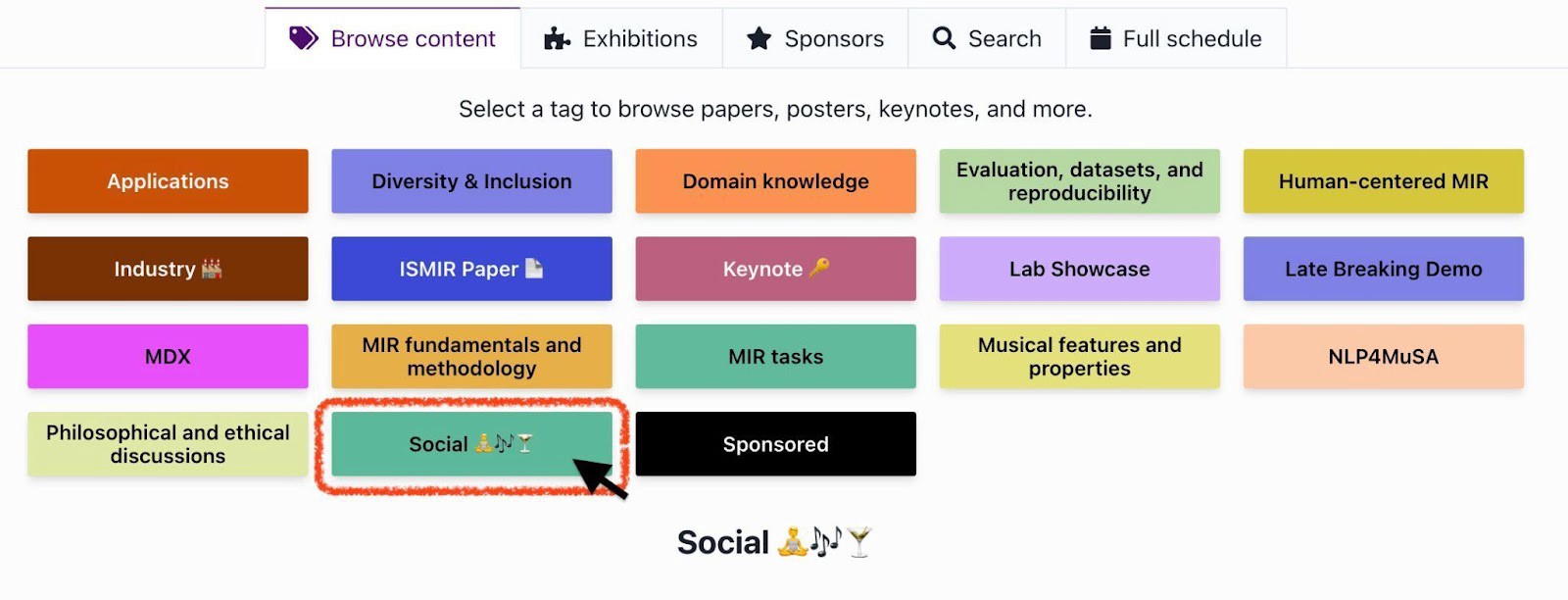
MIR Fundamentals
Many of the people we surveyed wished they had a better grasp of MIR fundamentals before attending their first conference. This includes deep learning, signal processing, and general knowledge about common types of musical data. In addition to this year’s ISMIR tutorials, some great resources exist on these topics, most of which are freely accessible.
The list below includes options for a wide variety of experience levels.
Steve Tjoa: Notes on Music Information Retrieval - Jupyter notebook walkthroughs
Walkthroughs covering topics from music representation, signal processing, deep learning, and the applications of these in the MIR community.
- Meinard Müller: Fundamentals of Music Information Retrieval: Book homepage
Seminal and comprehensive textbook on the field of MIR, slides and python notebooks exist as well for a higher level introduction.
Felix Weninger et al (2012): Music Information Retrieval: An Inspirational Guide to Transfer from Related Disciplines - Paper
Paper meant for researchers coming to MIR from other non-musical fields, especially speech and language processing.
Choi et al (2018): A Tutorial on Deep Learning for Music Information Retrieval - Paper
Paper written to help introduce MIR researchers to the field of Deep Learning.
- Stanford CS224N: Natural Language Processing with Deep Learning - Lecture Videos
Stanford CS231N: Convolutional Neural Networks for Visual Recognition - Lecture Notes
Two Stanford courses that offer a good survey of the state of the art in machine learning. They focus on language and vision, but the foundations applied to MIR as well.
- Jay Alammar: A Visual and Interactive Guide to the Basics of Neural Networks - Blog Post
Jay Alammar: The Illustrated Transformer - Blog Post
These blog posts give interactive walkthroughs of important concepts in contemporary deep learning. They both can serve as useful reference materials while reading papers.
Encountering many of these concepts for the first time might seem daunting. However, it is important to keep in mind that these are only technical tools used by MIR researchers in the service of studying what we love, music.
Equipped with a passion for music and technology, new researchers should feel confident in their ability to make meaningful contributions to the conference, and to the field of MIR. We hope that with some help from these initiatives and the support of the community, this year will be the best ISMIR conference yet for new attendees!